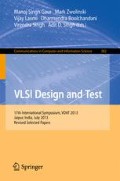Abstract
This paper presents an improved g m /I D methodology for the design of low-power CMOS operational transconductance amplifier (OTA) circuit using nano-scale CMOS technology. This methodology takes into considerations the dependence of the Early voltage parameter with the bias points of a nano-scale MOS transistor. With such considerations, the DC voltage gain of the circuit can be controlled by adjusting the bias points of the transistors and keeping the channel length constant. The advantage of the improved methodology over the traditional methodology has been discussed and illustrated with simulation results.
Access this chapter
Tax calculation will be finalised at checkout
Purchases are for personal use only
Preview
Unable to display preview. Download preview PDF.
References
Magnelli, L., et al.: Design of a 75-nW, 0.5V subthreshold complementary metal-oxide-semiconductor operational amplifier. Int. Journal Circuit Theory and Applications (2013)
Silveira, F., Flandre, D., Jesper, P.: A g m /I D -based Methodology for the Design of CMOS Analog Circuits and its Application to the Synthesis of a Silicon-on-Insulator. IEEE Journal Solid State Circuits 31, 1314–1319 (1996)
Cortes, F., Fabris, E., Bampi, S.: Analysis and design of comparators in CMOS 0.35 μm technology. Microelectronics Reliability 44, 657–664 (2004)
Ferreira, L., Pimenta, T., Moreno, R.: An ultra-low voltage ultra-low power CMOS Miller OTA with rail-to-rail input/output swing. IEEE Trans. Circuits and Systems-II 45, 843–847 (2007)
Taur, Y., Ning, T.: Fundamentals of Modern VLSI Devices. Cambridge Univ. Press (1998)
Tsividis, Y., McAndrew, C.: Operation and Modeling of The MOS Transistor, 2nd edn. Oxford University Press (2010)
Allen, P., Holberg, D.: CMOS Analog Circuit Design. Oxford University Press (2004)
Dunga, M., et al.: BSIM 4.6.0 MOSFET Model-User’s Manual. Department of Electrical Engineering and Computer Sciences, University of California, Berkeley (2006)
Zhao, W., Cao, Y.: New Generation of Predictive Technology Model for Sub-45 nm Early Design Exploration. IEEE Transactions Electron Devices 53, 2816–2823 (2006)
Author information
Authors and Affiliations
Editor information
Editors and Affiliations
Rights and permissions
Copyright information
© 2013 Springer-Verlag Berlin Heidelberg
About this paper
Cite this paper
Paul, S., Dana, A., Pandit, S. (2013). An Improved g m /I D Methodology for Ultra-Low-Power Nano-Scale CMOS OTA Design. In: Gaur, M.S., Zwolinski, M., Laxmi, V., Boolchandani, D., Sing, V., Sing, A.D. (eds) VLSI Design and Test. Communications in Computer and Information Science, vol 382. Springer, Berlin, Heidelberg. https://doi.org/10.1007/978-3-642-42024-5_16
Download citation
DOI: https://doi.org/10.1007/978-3-642-42024-5_16
Publisher Name: Springer, Berlin, Heidelberg
Print ISBN: 978-3-642-42023-8
Online ISBN: 978-3-642-42024-5
eBook Packages: Computer ScienceComputer Science (R0)

